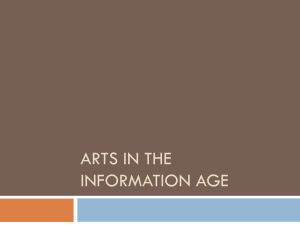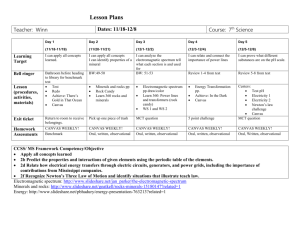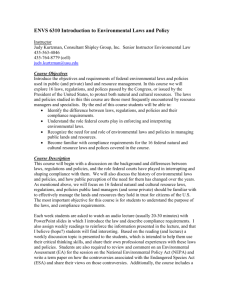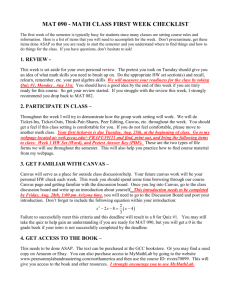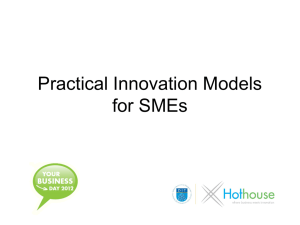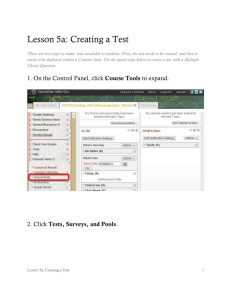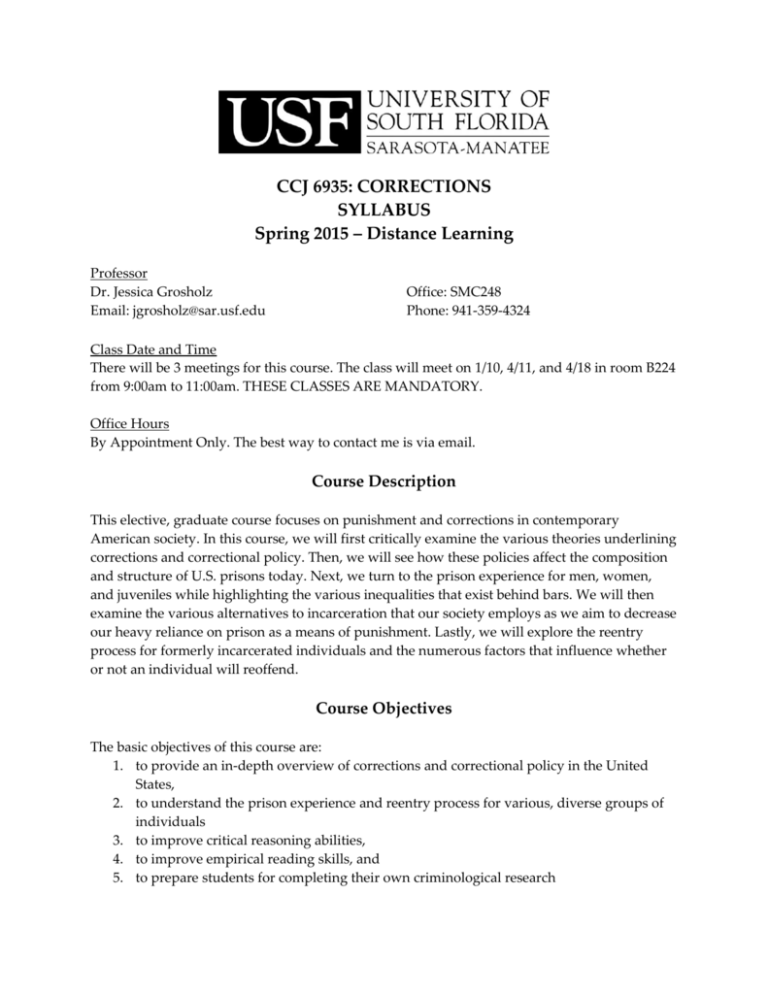
CCJ 6935: CORRECTIONS
SYLLABUS
Spring 2015 – Distance Learning
Professor
Dr. Jessica Grosholz
Email: jgrosholz@sar.usf.edu
Office: SMC248
Phone: 941-359-4324
Class Date and Time
There will be 3 meetings for this course. The class will meet on 1/10, 4/11, and 4/18 in room B224
from 9:00am to 11:00am. THESE CLASSES ARE MANDATORY.
Office Hours
By Appointment Only. The best way to contact me is via email.
Course Description
This elective, graduate course focuses on punishment and corrections in contemporary
American society. In this course, we will first critically examine the various theories underlining
corrections and correctional policy. Then, we will see how these policies affect the composition
and structure of U.S. prisons today. Next, we turn to the prison experience for men, women,
and juveniles while highlighting the various inequalities that exist behind bars. We will then
examine the various alternatives to incarceration that our society employs as we aim to decrease
our heavy reliance on prison as a means of punishment. Lastly, we will explore the reentry
process for formerly incarcerated individuals and the numerous factors that influence whether
or not an individual will reoffend.
Course Objectives
The basic objectives of this course are:
1. to provide an in-depth overview of corrections and correctional policy in the United
States,
2. to understand the prison experience and reentry process for various, diverse groups of
individuals
3. to improve critical reasoning abilities,
4. to improve empirical reading skills, and
5. to prepare students for completing their own criminological research
University of South Florida Sarasota-Manatee
CCJ 6935
Upon completion of this course, students will be able to:
1. Demonstrate an understanding of the United States corrections industry
2. Read and understand empirical criminological research
3. Write an extensive literature review in correct APA format
4. Demonstrate familiarity with significant scholarship on a topic
5. Meet all of the assignment requirements
Required Books
1. Cullen, Francis T. and Cheryl Lero Jonson. 2012. Correctional Theory: Context and
Consequences. Thousand Oaks, CA: Sage Publications
2. George, Erin. 2015 (2010). A Woman Doing Life: Notes from a Prison for Women. New York,
NY: Oxford University Press.
3. Fader, Jamie J. 2013. Falling Back: Incarceration and Transitions to Adulthood among Urban
Youth. New Brunswick, NJ: Rutgers University Press.
All other readings will be found on the course Canvas site.
Course Requirements
Weekly Memos/Reflection Papers:
Canvas Discussion Questions & Responses:
Final Presentation:
Final Literature Review:
25%
15%
20%
40%
Grading System
97 and above = A+
96-93 = A
92-90 = A89-87 = B+
86-83 = B
82-80 = B79-77 = C+
76-73 = C
72-70 = C69-67 = D+
66-63 = D
62-60 = D59 and below = F
2
University of South Florida Sarasota-Manatee
CCJ 6935
Assignments
Weekly Memos/Reflection Papers
You will prepare a 3-page memo reflecting on each week’s readings (typed and double-spaced).
There will be a total of 12 weekly memos/reflection papers. You should regard these memos as
ideas in progress rather than as finished products. In these memos you should reflect upon
and/or critique the readings. Do not summarize them! These reflection papers will allow you to
digest each week’s readings as well as provide questions, criticisms, and new ideas. Your
memos should provide a thoughtful and considered evaluation and/or critique of issues raised
in the readings. Memos should be submitted via Canvas by 11:59pm on Saturday of each week.
The weekly memos/reflection papers comprise 25% of your final grade.
Canvas Discussion Questions and Responses
Class discussion is an integral part of any graduate course – virtual or face-to-face. As a result,
you must post 3 questions about the assigned readings/topic on the Canvas Discussion Board
by 6pm on Friday of each week. These questions will help stimulate online class discussion
throughout the semester. Questions that are submitted after 6pm will not be accepted. Each
week’s questions are worth 9 points (3 points per question). Yes/no discussion questions will
not be accepted.
In addition to posting 3 discussion questions, you must thoughtfully respond to 3 questions
posted by your fellow classmates by 6pm on Saturday of each week. Responses that are
submitted after 6pm will not be accepted. Each week’s responses are worth 9 points (3 points
per response). In total, each week’s discussion questions and responses are worth 18 points and
comprise 15% of your final grade.
Final Literature Review
You will complete a 15-page (excluding references), typed, double-spaced extensive literature
review on the topic of your choosing. This paper will address the related research on your topic
and subsequent research question. You will conduct a review of the most PERTINENT and
RECENT research articles from professional, peer-reviewed journals. SOCIOFILE, ERIC, and
NCJRS are just a few of the reliable databases you should use to find these articles. Other
databases may also be used. Use at least eight articles. You should begin working on your
literature review as soon as possible, as acquiring some of your articles may require interlibrary
loan. Your discussion and analysis of the literature should be directed toward your overall topic
and research question.
Everything should be your own words – you should have no more than 3 direct quotes. All
papers will be run through a plagiarism software program—so please cite your materials. An
APA citation guide will be provided via Canvas.
3
University of South Florida Sarasota-Manatee
CCJ 6935
You must discuss your topic with me by January 24th. Your final literature review must be
turned in electronically via Canvas by 11:59pm on April 29th. Late penalties apply – for every
24 hours that your paper is late, you will lose a full letter grade. Computer problems are NOT
an acceptable excuse for late projects so start your paper early and expect problems. Be sure to
back-up all of your work.
You are also required to use the USFSM Writing Center at least once throughout the semester.
The USFSM Writing Center accepts appointments either in person or via email. You must
receive documentation from the writing center that you have used their services. This
documentation is to be submitted with your final paper submission on 4/29. Failure to submit
proper writing center documentation will result in a 10 point deduction from your final
research proposal grade. The final literature review comprises 40% of your final grade. More
information will be provided as the semester progresses.
Final Presentation: You are also required to present your final paper in class. Final
presentations will take place on 4/11 and 4/18. These sessions are mandatory for all students,
even if you are not presenting that day. The presentations should be between 10 and 15 minutes
and should lead the audience through your literature review. Each presentation will be
followed by a Q&A session. Your presentation comprises 20% of your final grade.
Extra Credit: There will be two opportunities for extra credit in this course. More details will be
provided in class on January 10th and via Canvas.
Course Policies
Attendance: The three class meetings are MANDATORY. If you miss either of these classes
with an unexcused absence, a full letter grade will be deducted from your final grade. Excused
absences include illness (self or dependent) and bereavement. Please discuss any absences with
me in advance.
Laptop Use: Students are welcome to bring their laptops to the three mandatory class meetings.
If you are using a laptop to take notes, I expect that you will not be on the Internet, responding
to emails, on Facebook or otherwise off task.
Canvas Use and Support: I will be using Canvas to post readings, grades, and important
announcements. This will also be where you will submit your assignments. I will also use
Canvas to email students in this course. Please make sure you check your Canvas and USF
email daily for important announcements.
4
University of South Florida Sarasota-Manatee
CCJ 6935
Information on how to use Canvas is available at http://usfsm.edu/e-learning-services/studentresources/. You could also contact the Information Commons Academic Resource Desk at 941359-4225 or usfsm.edu/infocommons for assistance with Canvas problems.
The USF Tampa IT Help desk also provides 24 hour support for Canvas. Please call 813-9741222 or email: help@usf.edu if you need assistance outside of USFSM’s E-Learning hours.
Additionally, CANVAS tutorials can be found in the Student Quickstart Guide at
http://guides.instructure.com/m/8470.
Please extensively familiarize yourself with the course website at the very beginning of the
semester so you do not put yourself in a situation where your assignment will be late because
you could not get an immediate response to a technology-related question. I will not accept
assignments being late because of technology-related issues.
Plagiarism Software: The University of South Florida has an account with an automated
plagiarism detection service which allows student assignments to be checked for plagiarism.
Your final paper will be submitted to Turnitin via Canvas. Your paper will be automatically
compared with a database of journal articles, web articles, and previously submitted papers. I
will receive a report showing exactly how a student’s paper was plagiarized.
Pursuant to the provisions of the Family Educational Rights and Privacy Act (FERPA), students
are requested to maintain confidentiality as a way to keep their personal contact information
(i.e., name, address, telephone) from being disclosed to vendors or other outside agencies. By
your submission, you are also agreeing to release your original work for academic purposes to
Turnitin.
Additional information about Turnitin scores will be incorporated in the literature review
guidelines and rubric will be posted to the course Canvas site separately.
USFSM and USF System Policies
Academic Dishonesty: The University considers any form of plagiarism or cheating on exams,
projects, or papers to be unacceptable behavior. Please be sure to review the university’s policy
in the catalog, USFSM Undergraduate Catalog or USFSM Graduate Catalog and the USF
Student Code of Conduct.
Undergraduate:
http://www.sarasota.usf.edu/Academics/Catalogs/
Graduate:
http://www.sarasota.usf.edu/Academics/Catalogs/
USF Student Code of Conduct:
http://www.sa.usf.edu/srr/page.asp?id=88
5
University of South Florida Sarasota-Manatee
CCJ 6935
Academic Disruption: The University does not tolerate behavior that disrupts the learning
process. The policy for addressing academic disruption is included with Academic Dishonesty
in the USFSM Catalog and the USF Student Code of Conduct. See above for the websites.
Contingency Plans: In the event of an emergency, it may be necessary for USFSM to suspend
normal operations. During this time, USFSM may opt to continue delivery of instruction
through methods that include but are not limited to: Canvas, Elluminate, Skype, and email
messaging and/or an alternate schedule. It is the responsibility of the student to monitor Canvas
for each class for course specific communication, and the main USFSM and College websites,
emails, and MoBull messages for important general information. The USF hotline at 1 (800) 9924231 is updated with pre-recorded information during an emergency.
Disabilities Accommodation: Students are responsible for registering with the Office of
Students with Disabilities Services (SDS) in order to receive academic accommodations.
Reasonable notice must be given to the SDS office (typically 5 working days) for
accommodations to be arranged. It is the responsibility of the student to provide each instructor
with a copy of the official Memo of Accommodation. Contact Information: Disability
Coordinator: 359-4714; email: disabilityservices@sar.usf.edu and website:
http://usfsm.edu/disability-services/
Fire Alarm Instructions: At the beginning of each semester please note the emergency exit
maps posted in each classroom. These signs are marked with the primary evacuation route
(red) and secondary evacuation route (orange) in case the building needs to be evacuated. See
information available on the USFSM student and faculty webpages at www.usfsm.edu
Religious Observances: The University recognizes the right of students and faculty to observe
major religious holidays. Students who anticipate the necessity of being absent from class for a
major religious observance must provide notice of the date(s) to the instructor, in writing, by
the second week of classes. http://generalcounsel.usf.edu/policies-and-procedures/pdfs/policy10-045.pdf
Sexual Misconduct/Sexual Harassment Reporting: USFSM is committed to providing an
environment free from sex discrimination, including sexual harassment and sexual violence
(USF System Policy 0-004). The Counseling and Wellness Center is a confidential resource
where you can talk about incidents of sexual harassment and gender-based crimes including
sexual assault, stalking, and domestic/relationship violence. This confidential resource can help
you without having to report your situation to either the Office of Student Rights and
Responsibilities (OSSR) or the Office of Diversity, Inclusion, and Equal Opportunity (DIEO),
unless you request that they make a report.
Please be aware that in compliance with Title IX and under the USF System Policy, educators
must report incidents of sexual harassment and gender-based crimes including sexual assault,
stalking, and domestic/relationship violence. If you disclose any of these situations in class, in
6
University of South Florida Sarasota-Manatee
CCJ 6935
papers, or to me personally, I am required to report it to OSSR or DIEO for investigation. The
Deputy Coordinator for USFSM is Mary Beth Wallace, AVP for Student Enrollment,
Engagement and Success, 941-359-4330 or marybeth@sar.usf.edu.
Campus Resources:
Counseling Center and Wellness Center 941-487-4254
Victim Advocate (24/7) 941-504-8599
List of off-campus resources:
Hope of Manatee: 941-755-6805
Safe Place & Rape Crisis Center (SPARCC) – Sarasota: 941-365-1976
First Call for Help- Manatee: 941-708-6488
Sarasota & North Port 941-366-5025
Manatee Glens: 941-782-4800
Emergency Preparedness: It is strongly recommended that you become familiar with the USF
Sarasota-Manatee Emergency Action Plan on the Safety Preparedness. See information available
on the USFSM student and faculty webpages at www.usfsm.edu
Web Portal Information: Every newly enrolled USF student receives an official USF e-mail
account. Students receive official USF correspondence and Canvas course information via that
address. Therefore it is the student’s responsibility to check their USF email regularly.
Instructional Copyright: Students may not sell notes or other course materials.
Course Schedule
Topics, Readings and Dates:
Cullen and Jonson: Correctional Theory
George: A Woman Doing Life
Fader: Falling Back
C: Canvas
Week
1
Date
1/5-1/11
Topic
What is
Corrections?
Readings & Assignments
Readings
Cullen and Jonson: Chapters 1 & 2 (pp. 1-36)
Assignments
None
7
University of South Florida Sarasota-Manatee
CCJ 6935
2
3
4
5
1/121/18
1/191/25
1/26-2/1
2/2-2/8
Correctional
Theory:
Retribution,
Deterrence, &
Incapacitation
Correctional
Theory:
Restorative
Justice &
Rehabilitation
Readings
Cullen and Jonson: Chapters 3-5 (pp. 37-126)
Assignment
Weekly Memo/Reflection Paper
3 Canvas Discussion Questions
3 Discussion Question Responses
Readings
Cullen and Jonson: Chapters 6-7 (pp. 127-170)
Assignment
Weekly Memo/Reflection Paper
3 Canvas Discussion Questions
3 Discussion Question Responses
Readings
C: Johnson (pp. 1-93)
C: Lyons (pp. 34-47)
C: Markarios and Maahs (pp. 336-357)
Organization and
Structure of
Prisons
Assignment
Weekly Memo/Reflection Paper
3 Canvas Discussion Questions
3 Discussion Question Responses
Readings
C: Trammell (pp. 746-771)
C: Mears et al. (pp. 695-728)
C: Briggs et al. (pp. 1341-1376)
C: Cochran (pp. 433-440)
C: Bales and Miller (pp. 394-403)
C: Walters and Crawford (pp. 407-413)
Prison
Experience:
Culture, Violence,
and Misconduct
Assignment
Weekly Memo/Reflection Paper
3 Canvas Discussion Questions
3 Discussion Question Responses
8
University of South Florida Sarasota-Manatee
CCJ 6935
6
2/9-2/15
Readings
C: Collica-Cox (pp. 931-952)
C: Kim and Clark (pp. 196-204)
C: Wilson et al. (pp. 347-368)
C: Lahm (pp. 37-52)
Prison
Experience:
Treatment and
Rehabilitation
Assignment
Weekly Memo/Reflection Paper
3 Canvas Discussion Questions
3 Discussion Question Responses
Readings
George: Chapters Intro-6 (pp. 1-119)
7
2/162/22
Women in Prison
Assignment
Weekly Memo/Reflection Paper
3 Canvas Discussion Questions
3 Discussion Question Responses
Readings
George: Chapters 7-Afterward (pp. 120-235)
8
2/23-3/1
9
3/2-3/8
Women in Prison,
Cont’d
Assignment
Weekly Memo/Reflection Paper
3 Canvas Discussion Questions
3 Discussion Question Responses
Spring Break
Readings
Fader: Chapters Intro-4 (pp. 1-101)
10
3/9-3/15
Juveniles in
Prison
Assignment
Weekly Memo/Reflection Paper
3 Canvas Discussion Questions
3 Discussion Question Responses
9
University of South Florida Sarasota-Manatee
CCJ 6935
3/21
Last Day to Drop With a “W;” No Refund, No Academic Penalty
Readings
Fader: Chapters 5-Conclusion (pp. 102-232)
11
12
13
3/163/22
3/233/29
3/30-4/5
Juveniles in
Prison, Cont’d
Assignment
Weekly Memo/Reflection Paper
3 Canvas Discussion Questions
3 Discussion Question Responses
Readings
C: Mauer (pp. 98-119)
C: Western & Pettit (pp. 37-43)
C: Reiman (pp. 111-156)
Inequalities in
Prison
Assignment
Weekly Memo/Reflection Paper
3 Canvas Discussion Questions
3 Discussion Question Responses
Readings
C: DeMatteo et al. (pp. 64-71)
C: Mitchell et al. (pp. 60-71)
C: Sevigny et al. (pp. 416-425)
C: Sullivan et al. (pp. 1-28)
C: Cid (pp. 459-480)
Alternatives to
Incarceration
Assignment
Weekly Memo/Reflection Paper
3 Canvas Discussion Questions
3 Discussion Question Responses
14
4/6-4/12
Reentry and
Recidivism
&
Final
Presentations
Readings
C: Visher and Travis (pp. 89-113)
C: Clear et al. (pp. 179-208)
C: Mears and Cochran (pp. 125-208)
C: Benda (pp. 325-342)
10
University of South Florida Sarasota-Manatee
CCJ 6935
Assignment
Weekly Memo/Reflection Paper
3 Canvas Discussion Questions
3 Discussion Question Responses
15
16
4/134/19
4/204/26
Readings
None
Final
Presentations
Assignment
Continue working on final paper
Final Paper Due by 11:59pm on 4/29 with proper
Writing Center documentation
11


